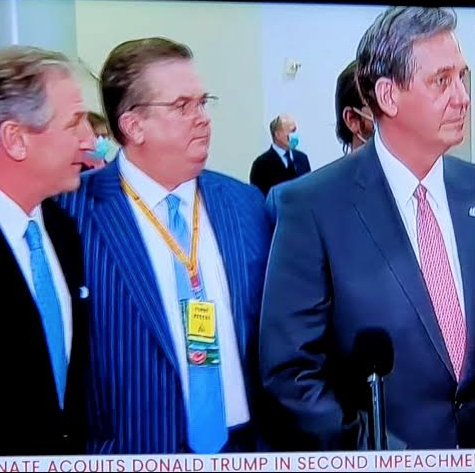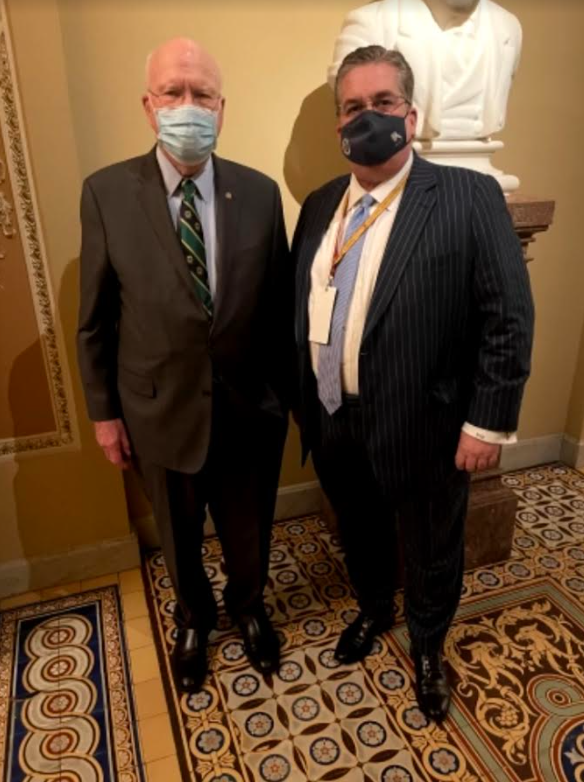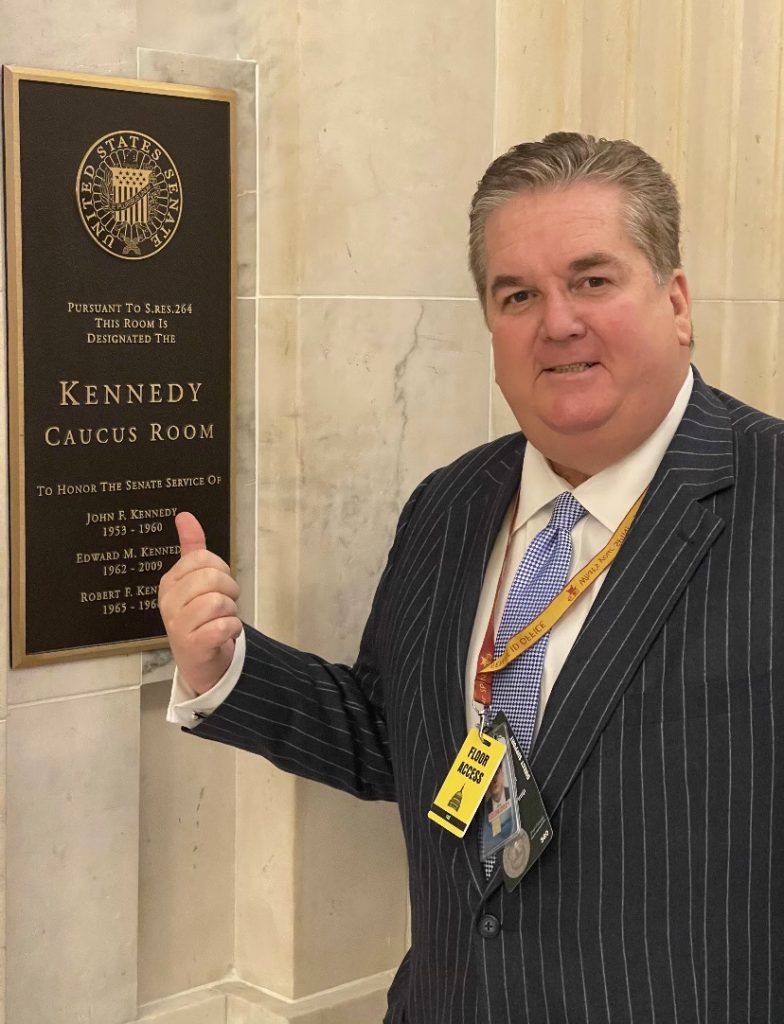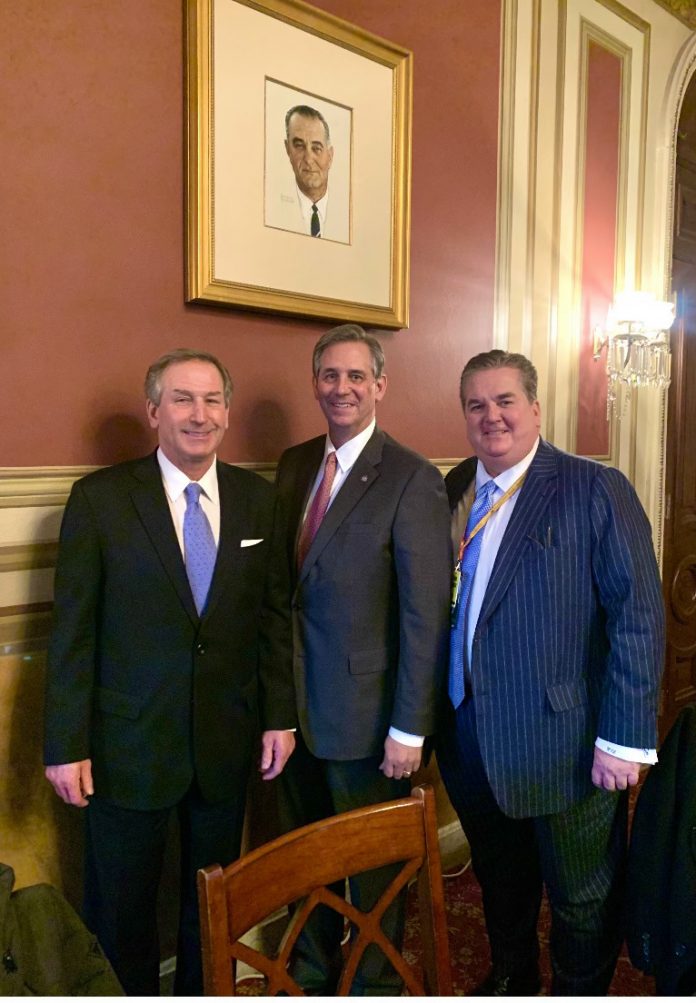William J. Brennan has been in plenty of courtrooms, representing some high-profile defendants, over the course of a nearly 34-year career practicing law.
But Brennan knew the significance of his latest big case — as one of the lawyers representing former President Donald Trump in his U.S. Senate impeachment trial.
Just four presidents have faced impeachment trials in the Senate: Andrew Johnson in 1868, Bill Clinton in 1999 and Trump last year and earlier this month.
“This was history unfolding before our eyes,” Brennan said.
And Brennan had a front-row seat, joining David Schoen, Michael van der Veen, Bruce Castor and Julieanne Bateman in securing an acquittal for Trump on one count of incitement of insurrection for the Jan. 6 attack on the Capitol.

Brennan, 63, had no idea in 1987 when he graduated from Temple School of Law that he’d be part of such a monumental case, describing himself as a “rowhouse kid from Northeast Philadelphia representing the president in an impeachment trial.”
Brennan spent his early years in Kensington before moving to the Far Northeast. He graduated from St. Anselm Grammar School, then Archbishop Ryan High School in 1975. He would go on to receive an undergraduate degree from La Salle before entering law school.
His well-known cases have included priests, a Traffic Court judge and a George Washington High School graduate charged with prostitution in a bid to secure tickets to a Phillies World Series game in 2009.
So, how did he come to be part of Trump’s team? The former president chose Castor, a former Montgomery County district attorney, to join the Alabama-based Schoen to lead his defense. Castor recently joined van der Veen’s law firm, and brought him on board. Brennan is friends with van der Veen, and agreed to join the defense. Bateman, too, works for van der Veen’s firm.
Brennan does not have much of a background in politics, other than a bid for committeeman in the 66th Ward in 1978 on the same ballot as a proposed Home Rule Charter change to allow Mayor Frank L. Rizzo to seek a third term.
Trump’s lawyers saw the trial as simply representing a client.
“This was in no way some type of partisan political mission,” Brennan said.
Trump was not in Washington for the trial. Brennan said attorneys spoke with the former president on the phone, but not often, adding that he never asked them to bring up alleged fraud involving the presidential election.
Brennan said the defense focused on the following arguments: the Senate lacks jurisdiction to try a former president; Trump enjoys First Amendment rights to speak; and the trial lacked due process.

This was no ordinary trial, in Brennan’s view. He pointed out that it was only after the trial wrapped up that House Democratic managers decided they wanted to call witnesses. In addition, he pointed out that the trial was presided over by Vermont Sen. Patrick Leahy, who not only had a vote but was widely expected to vote to convict Trump.
“It was a proceeding,” Brennan said, as opposed to a traditional trial.
Brennan’s assignments were to be the clock manager and the liaison with Capitol Hill staff. That was fine for the father of seven, who has been married for 35 years to his wife Sue, whom he met at La Salle.
“I wanted to keep a low profile in the midst of a storm,” he said.
The defense team met with Republican Sens. Mike Lee, Lindsey Graham and Ted Cruz. Separately, Brennan interacted with others involved in the trial. He described Leahy as a “total gentleman.” He referred to Maine Sen. Susan Collins as “very kind and gracious.” And he said Stacey Plaskett, a House impeachment manager from the Virgin Islands, was a “professional.”
Trump announced the defense team on Feb. 1, just eight days before the start of the trial. Brennan does not agree that an acquittal was a slam dunk.
“Nothing could be further from the truth,” he said. “We worked around the clock. It was a lot of pressure, but it was fun. It was a good team for a last-minute call to duty. It was a massive undertaking. We did a good job.”
Brennan conceded the House managers got off to a good start with an emotional speech by Maryland Rep. Jamie Raskin about the Jan. 6 incident. That’s when he said Castor called an audible, following Raskin with remarks intended to be “damage control” as opposed to a full-throated defense.
“It did what we wanted to do,” Brennan said of Castor’s speech, “turn down the temperature in the room.”

The Senate is deadlocked at 50-50, and two-thirds, or 67 senators, would have needed to vote guilty for a conviction. Brennan figured no Democrats would vote to acquit, since all Democrats voted to convict in Trump’s first impeachment trial. The defense expected they would lose some Republicans, since six of them — including Pennsylvania Sen. Pat Toomey — had earlier voted that the trial was constitutional.
Brennan said one key was to win the vote of Senate Minority Leader Mitch McConnell, which they did.
The final vote was 57 guilty, 43 not guilty.
In the aftermath, Brennan was dismayed that protesters gathered outside van der Veen’s Chester County home, terrorizing his wife by throwing eggs, smashing windows and painting “traitor” on the driveway.
As for the trial itself, Brennan said the Philly-based law team did its job.
“In the end,” he said, “the client was pleased.” ••






